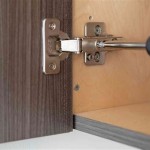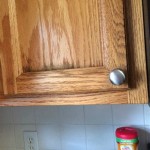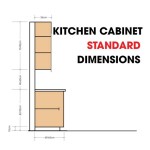How to Laminate Kitchen Doors
Laminating kitchen doors offers a cost-effective and visually appealing way to revitalize your kitchen's appearance. This process involves covering existing doors with a thin, durable sheet of laminate, providing a fresh, modern, and easily maintainable finish. While professional laminators can achieve excellent results, the process can be undertaken with DIY skills and the right tools, allowing for greater control over the final aesthetic and a sense of accomplishment.
Preparing the Doors
The success of any laminating project hinges on thorough preparation. Begin by removing the doors from their hinges, ensuring they are free from any obstructions like handles or knobs. Next, clean the surfaces meticulously with a degreasing agent, eliminating any grease, dirt, or residue that could hinder adhesion. Sanding the surfaces with fine-grit sandpaper helps create a smooth and even texture, promoting better adhesion. Finally, fill any imperfections or scratches with wood filler, allowing it to dry completely before sanding again for a flawless finish.
Cutting and Applying the Laminate
Laminate comes in a wide variety of colors, patterns, and textures, offering ample options for customizing your kitchen's appearance. Measure the doors precisely, ensuring to account for any overlaps or seams. Cut the laminate according to the measurements using a sharp utility knife and a straightedge for clean, precise lines. Carefully apply a layer of contact adhesive to both the back of the laminate and the prepared door surface, ensuring it is spread evenly. Wait for the adhesive to become tacky, allowing for the laminate to be positioned precisely on the door.
After positioning the laminate, firmly press it onto the door surface, working from the center outwards to eliminate any air bubbles. Use a roller or a firm, flat object to ensure consistent pressure and achieve a smooth, even finish. Allow the adhesive to cure completely before trimming any excess laminate with a sharp utility knife and a straightedge. Finally, smooth the edges with fine-grit sandpaper for a professional look.
Finishing Touches
Once the laminate is securely attached, you can add finishing touches like new handles and knobs, enhancing the overall aesthetic. These can be chosen in styles and finishes that complement the new laminate, creating a cohesive and stylish look. Consider replacing existing hinges with newer, more modern versions. Lastly, inspect the laminated doors for any imperfections and address them with touch-up paint, ensuring a flawless, professional finish.
Essential Tools and Materials
Before embarking on your laminating project, gather the necessary tools and materials:
- Laminate sheets
- Contact adhesive
- Utility knife
- Straightedge
- Roller or firm, flat object
- Fine-grit sandpaper
- Degreasing agent
- Wood filler
- Measuring tape
- Pencil
- New handles, knobs, and hinges (optional)
By meticulously following these steps and using the correct tools and materials, you can successfully laminate your kitchen doors and create a fresh, modern, and durable finish that will transform the heart of your home.

How To Paint Laminate Kitchen Cabinets Angela Marie Made

Why Choose Paint Laminate Doors The Kitchen Door Company

Laminate Kitchen Cabinets For Your Jennings

How To Paint Laminate Kitchen Cabinets Easy Update

Laminate Cabinet Doors Quality Kitchen Since 2005

7 Reasons To Consider Laminate Cabinet Doors Dendra

The Best Finishes For Kitchen Cabinets Kitchens By Kathie

Affordable Laminate Kitchen Doors Stylish Durable Options

Laminate Kitchen Cabinets Pros And Cons Oppein

Mdf Laminated Kitchen Cabinet Doors Abbotsford Bc
Related Posts








